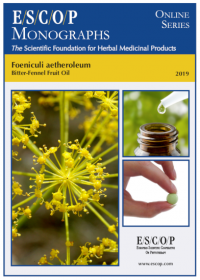Foeniculi aetheroleum (Bitter-Fennel fruit oil)
Foeniculum vulgare Miller, ssp. vulgare , var. vulgare
Published 2019
Format: PDF

ESCOP monographs The Scientific Foundation for Herbal Medicinal Products. Online series. Foeniculi aetheroleum (Bitter-fennel fruit oil). Exeter (UK): ESCOP; 2019.
SUMMARY
The herbal monograph selects and summarises scientific studies and
textbooks regarding efficacy, dosage and safety to support the
therapeutic uses of bitter-fennel fruit oil.
This herbal drug by definition consists of the volatile oil obtained by steam distillation from the ripe fruits of Foeniculum vulgare Miller, ssp. vulgare, var. vulgare.
Studies with its main characteristic constituents anethole and fenchone are included.
The therapeutic indications are dyspeptic complaints such as mild
spasmodic gastro-intestinal ailments, bloating and flatulence and
catarrh in the upper respiratory tract.
Administration of bitter-fennel fruit oil addresses posology; its
duration of use; contra-indications; special warnings; special
precautions for use; interactions with other medicinal products; other
forms of interaction; in pregnancy and lactation; its effects on ability
to drive; undesirable effects; overdose.
In vitro experiments with the oil demonstrated antimicrobial,
antioxidant, anticoagulant and spasmolytic effects. Anethole showed
local anaesthetic, tumour-inhibiting and cytotoxic effects.
In vivo experiments with bitter-fennel fruit oil or its
extracts and the main constituents anethole and fenchone demonstrated
secretolytic, expectorant, oestrogenic, antitumour, anti-genotoxic,
enzyme-modulating, analgesic, anti-thrombotic, anti-hepatotoxic and
osteoporosis-prophylactic properties.
Controlled clinical studies with the oil were used in children with colic and in patients with dysmenorrhea.
Preclinical safety data were assessed in toxicity studies. The oil may
have abortifacient effects and toxic effects on foetal cells. There was
no evidence of teratogenicity. Safety data were assessed in a human
study with children. No side effects were reported.
The selection of literature cited in the monograph is aimed at bringing
together relevant information about the possible physiological roles of
bitter-fennel fruit oil and its major constituents.
KEYWORDS
- Foeniculum vulgare Miller, ssp. vulgare, var. vulgare
- Foeniculi aetheroleum
- Bitter-fennel fruit oil
- Dyspeptic complaints
- Bloating
- Flatulence
- Catarrh of the upper respiratory tract



